Strength Training for Women Over 40
Your Complete Guide to Getting Stronger, Healthier and Aging Better
For a long time, I thought the recipe for staying lean and healthy was simple: cardio and low-calorie eating. That’s what many of us grew up believing, especially as women. We were told to avoid lifting weights and to stick with running, cycling, or group fitness classes. Strength training? That was something the guys did and you don’t want to look bulky, right? But the science and my own experience says otherwise.
As I moved into my 40s, I started noticing shifts in my energy, my metabolism, and how my body responded to exercise. It became clear that building and preserving muscle was no longer optional, it was essential. And I wasn’t alone. More and more women are waking up to the fact that our bodies, especially in perimenopause and beyond, crave strength training and protein. Not endless cardio and calorie restriction.
The truth is, muscle is your metabolism. It’s your support system for aging well. It protects your bones, stabilizes hormones, supports insulin sensitivity, and improves your overall quality of life. Add in low-impact movement like walking, and you’ve got one of the most effective, sustainable ways to stay lean, strong, and energized long-term.
Oh! And that myth that lifting weights makes you bulky? Let’s leave that in the 90s where it belongs. Okay?!
SHORTCUTS: Fitness Forum | Protein Calculator | Download PDF with exercises

Strength training protects your bones, metabolism, and hormones. This helps you stay strong and vibrant as you age.
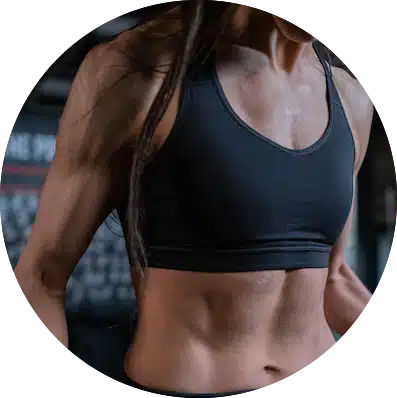
Learn how to train smart with effective, beginner-friendly exercises that help you feel strong-not sore or overwhelmed.

Strength isn’t just physical. It also boosts confidence, mood, and mental clarity. Feel stronger inside and out.
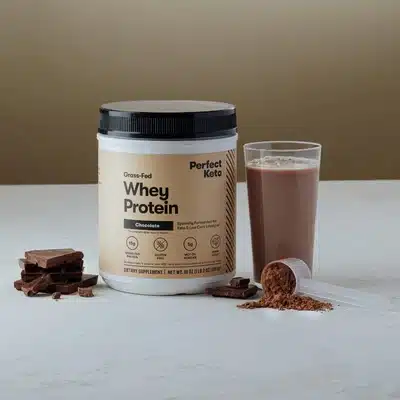
Looking for an easy way to support muscle recovery and stay energized after your workouts? I personally love Keto Whey Protein from Perfect Keto. It’s made with clean ingredients, MCTs for energy, and tastes amazing in a post-workout smoothie.
Whether you’re lifting weights, doing bodyweight training, or just starting out – protein matters, especially after 40.
Get 20% off with code: KAJSA
These two terms are often used interchangeably, but there is a slight difference worth noting.
Resistance training refers to any type of exercise where your muscles work against a force. This could be dumbbells, resistance bands, machines, or even your own body weight.
Strength training is a form of resistance training with a more specific goal: to increase muscular strength by progressively lifting heavier weights over time.
So, all strength training is resistance training, but not all resistance training is focused on building strength. Both approaches are important, especially for women over 40. Resistance training builds functional strength and protects your joints, while strength training helps preserve muscle mass, supports bone density, and boosts metabolism.
As we move into our 40s, strength training becomes one of the most powerful tools for protecting our health long-term. It helps us preserve muscle mass, which naturally starts to decline with age. This is important not just for physical strength, but for keeping our metabolism active and reducing the risk of age-related conditions like sarcopenia.
It’s also been shown to improve bone density, which is especially important for women approaching or moving through menopause. A period when the risk of osteoporosis increases significantly. Studies have found that lifting weights can actually stimulate bone growth and help prevent fractures later in life.
Strength training also plays a key role in supporting metabolic health, improving insulin sensitivity, and reducing the risk of type 2 diabetes. At the same time, it helps regulate hormones and contributes to better mood and mental clarity. And this is something many of us feel shifting in midlife.
What’s most exciting is that regular resistance training has even been linked to increased longevity and a better quality of life as we age. It’s not just about looking strong. It’s about feeling strong, capable, and resilient well into our later years.
Strength training doesn’t have to be intimidating. Here are three simple steps to help you ease in with confidence and build a routine that supports your body and goals.

Before you dive in, take a moment to assess how your body feels. Do you have any lingering joint pain, old injuries, or areas that feel especially tight or weak? If so, it might be worth speaking with a physiotherapist or movement specialist who can help you tailor your approach. But if you’re generally healthy, starting with simple, bodyweight-based movements is a great (and safe) way to begin.

You don’t need heavy weights to start seeing results. Bodyweight movements like squats, push-ups (on knees is fine!) and glute bridges help you build foundational strength and confidence. Focus on good form and consistency! Mastering the basics is where real progress begins.

You don’t need to train every day. In fact, 2–3 sessions per week is perfect for beginners. Give your body time to recover and adapt. And if you’re nervous or unsure, know that’s completely normal. Everyone starts somewhere and building strength happens one small step at a time.

📌 Want to save this for later? Download the full infographic here.
One of the biggest obstacles to getting started with strength training is simply knowing what to do. The good news? You don’t need a complicated plan to see results. Here’s how to design a weekly routine that’s simple, sustainable, and effective for women over 40.
2 Days/Week – Perfect for Beginners
Day 1: Lower Body Focus (e.g., squats, lunges, glute bridges, core work)
Day 2: Upper Body Focus (e.g., rows, push-ups, overhead press, planks)
This split gives you full-body coverage and plenty of recovery time.
3 Days/Week – For Progression & Balance
Day 1: Full Body – Strength Focus
Day 2: Lower Body + Core
Day 3: Upper Body + Mobility or Conditioning Finisher
You can also alternate push/pull days or rotate intensity levels.
Warm-Up (5–10 mins):
Light cardio, dynamic mobility, and movement prep (e.g., bodyweight squats, arm circles, cat-cow)
Compound Movements (Big Lifts):
These work multiple muscle groups (squats, deadlifts, rows, presses)
Accessory Work (Targeted Moves):
Smaller movements to support and balance your body (lateral raises, glute bridges, curls)
Core Training (Optional Finisher):
Planks, dead bugs, bird dogs, or stability ball work
Cool Down & Recovery (5 mins):
Stretching, breathwork, foam rolling—great for nervous system and muscle recovery

If you think creatine is only for gym bros, think again. Creatine is one of the most studied and effective supplements for building and maintaining muscle mass – but its benefits don’t stop there. It also supports cognitive function, energy production and recovery, making it especially valuable for women over 40.
As estrogen levels begin to shift, maintaining strength and mental clarity becomes even more important and creatine is a powerful ally for both.
That’s why I personally recommend DoNotAge.org’s Pure Creatine – a clean, high-quality option that fits perfectly into any longevity or strength-focused routine.
Use code KAJSA for 10% off your order
Strength training isn’t just about how you look. It’s about how you live, move and feel as you age. Studies show that higher levels of muscle mass, grip strength and VO₂ max are all strong predictors of longevity and overall health.
The ability to carry groceries, get up off the floor or maintain balance in your 70s, 80s and beyond often comes down to how much strength and mobility you’ve built along the way. Strength training helps preserve lean muscle, support metabolic health and protect against age-related decline – including falls, fractures and loss of independence.
Even just a few sessions per week can improve balance, coordination and joint stability, making strength training one of the most powerful longevity tools available – especially for women over 40.
You don’t need a full gym or fancy machines or health gadgets to start strength training. With just a few key tools, you can build an effective routine right from home – or mix and match with gym access if you prefer. When I was in my best shape, I was actually doing 100% of my strength training from my own house. It’s all about consistency, not equipment.
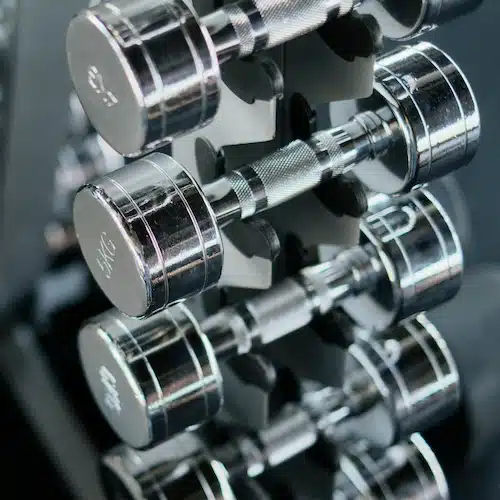
Dumbbells: A light and medium pair (e.g. 4–6 kg and 8–10 kg). Adjustable ones save space.
Resistance Bands: Great for warm-ups and accessory work. Choose a multi-strength set.
Kettlebell (Optional): Excellent for dynamic movements like swings. Start with 8–12 kg
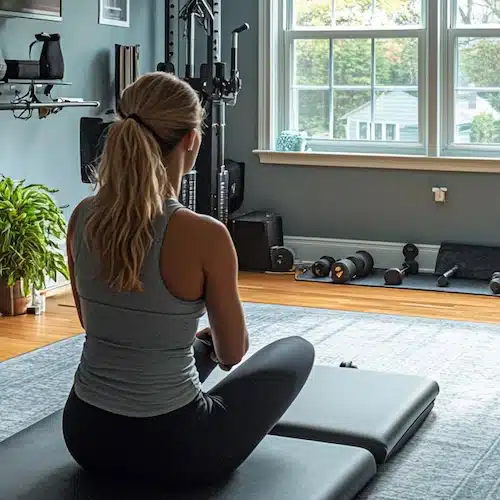
Home Training:
Flexible, private, and low-cost. You only need the basics to get results.
Gym Training:
Access to more equipment and heavier weights. Great for progression and variety.
There’s no one-size-fits-all. Do what fits your lifestyle best.

– Dumbbells (light + medium)
– Resistance bands
– Yoga mat
– Chair or bench
– Foam roller (optional)
– Timer app or phone for rest tracking
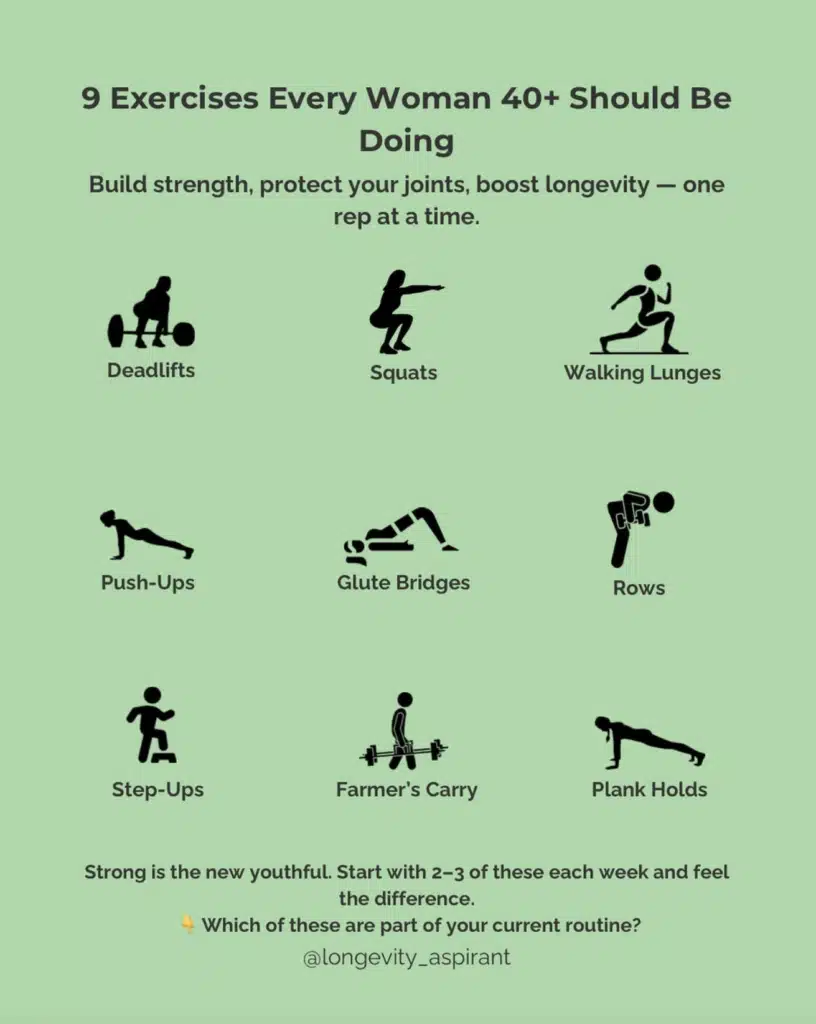
Strength training is only part of the equation. Your nutrition plays a huge role in how well you recover, build muscle and stay energized.
One of the most important nutrients for women over 40 is protein. As estrogen levels begin to decline, our ability to maintain and build muscle naturally decreases. Getting enough high-quality protein becomes essential – not just for strength, but also for bone health, hormonal balance and even satiety.
Aim for 1.6–2.2 grams of protein per kilo of body weight per day – but if that feels unclear, don’t worry. You can use our Protein Calculator below to get your personalized recommendation.
In addition to protein, hydration and minerals like magnesium, sodium and potassium play a vital role in muscle function and recovery. If you’re sweating a lot or fasting, it’s even more important to stay on top of your electrolyte intake. Check our list with the Best Longevity Supplements for supplement inspiration.
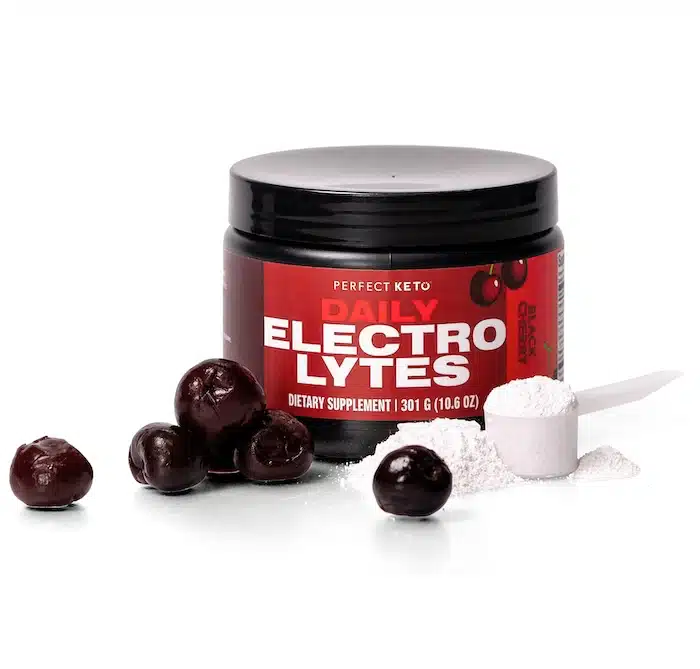
Hydration isn’t just about water. Your body needs minerals like sodium, potassium and magnesium to function at its best, especially during strength training or fasting.
I personally use the Perfect Keto Electrolytes to stay balanced and energized throughout the day. No sugar, no fillers – just the essentials your body craves.
Use code: KAJSA for 20% off your order
While food comes first, certain supplements can offer a real boost in strength, recovery and performance – especially for women 40+:
Creatine – Supports muscle recovery, brain health & strength
🔗 Shop Creatine at DoNotAge.org – Use code KAJSA for 10% off
Magnesium – Helps with sleep, muscle function and cramp prevention
🔗 Shop Magnesium at DoNotAge.org – Code KAJSA for 10% off
Whey Protein – Supports muscle protein synthesis after workouts
🔗 Shop Keto Whey Protein at Perfect Keto – Use code KAJSA for 20% off
The key is to find what works best for your body and your lifestyle. Remember, it’s the consistency of both your training and nutrition that truly drives results.
You’ve made it this far and that already says a lot. Starting (or restarting) strength training in your 40s isn’t just about physical health. It’s about claiming your power, supporting your future self and showing up with energy and confidence in everyday life.
Whether you’re working out from home, lifting weights at the gym, or just beginning with bodyweight basics – you’re doing something amazing for your health and longevity. And you’re not alone in this.
If you want ongoing tips, inspiration and support – make sure to join my newsletter and connect with me on Instagram at @longevity_aspirant. I love sharing insights, personal updates, and tools that help us age strong, not soft. Let’s keep growing stronger – together.
Am I too old to start?
Absolutely not. In fact, your 40s (and beyond) are the perfect time to start. Strength training helps protect muscle mass, bone density and mobility as we age. It’s never too late to build strength and resilience.
Will lifting weights make me bulky?
No. Women don’t naturally produce enough testosterone to bulk up like men do. What you’ll gain is toned, functional muscle, a boosted metabolism and a body that feels strong – not bulky.
What if I have injuries or joint pain?
You can still train – safely. Start with low-impact movements, focus on proper form and consider resistance bands or bodyweight exercises. If you’re unsure, a physiotherapist can help tailor your approach.
Do I need a personal trainer?
Not necessarily. Many women begin on their own using simple, effective programs (like this one!). That said, a knowledgeable trainer – especially one experienced with women 40+ – can be a great support if you’re looking for extra guidance or accountability.